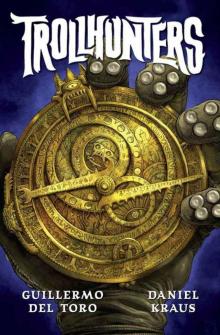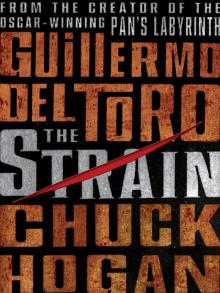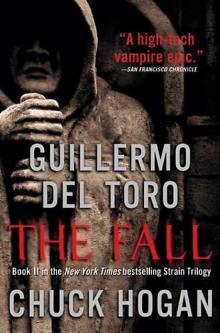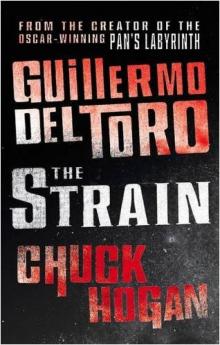- Home
- Guillermo Del Toro
The Hollow Ones Page 2
The Hollow Ones Read online
Page 2
Odessa said, “Immigrants, they get the job done.”
“Heroes,” said Leppo, proposing a toast with his coffee mug. “Now if only they could do a better job cleaning menus.”
Odessa smiled, then tasted onion in her salad and made a disappointed face.
The first emergency call came from Teterboro, saying a private jet had taken off without tower authorization. The aircraft had banked due east, over Moonachie and across Interstate 95 toward the Hudson River. The aircraft was assumed stolen and flying in an erratic pattern, rising and falling a few thousand feet in altitude, occasionally disappearing below the range of the radar.
The Port Authority of New York and New Jersey issued an emergency alert. Teterboro was shut down in accordance with FAA regulations, suspending all pending flights and redirecting inbound air traffic to Linden Municipal Airport, a small airfield in southern New Jersey used primarily for sightseeing tours and helicopters.
The first citizen 911 call came from the operator of a tugboat in the Hudson River, less than a mile south of the George Washington Bridge. He claimed that an airplane with no lights had flown very low between the tug and the bridge, making “popping noises” in the rain. The operator said it sounded like the pilot was throwing firecrackers at his boat, and feared it was the start of “another Nine Eleven.”
The second 911 call came from a fashion executive driving home to Fort Lee on the George Washington Bridge who reported seeing “a large drone” headed toward the Upper West Side of Manhattan.
There followed a flood of emergency calls from Manhattan residents, claiming that an aircraft had buzzed their apartment building or place of employment. The airplane was spotted over Central Park, heading due south along Fifth Avenue, but difficult to eyeball as it was flying dark. The pattern of the calls traced a flight path cutting diagonally across Lower Manhattan over Greenwich Village, then back toward the Hudson.
The Staten Island Ferry was cruising within sight of the Statue of Liberty when the Beechcraft swooped down on its stern. The only lights were the bursts of flame from the muzzle of the automatic rifle firing out the right side of the cockpit. Rounds picked at the orange hull of the MV Andrew J. Barberi, some cracking through the windows of the passenger space. Two commuters were directly injured by gunfire, neither gravely. Seventeen passengers were more seriously injured in the ensuing panic, causing the ferry to turn around and return to the Lower Manhattan terminal.
Three bullet holes were later found in the copper exterior of the crown and torch of the Statue of Liberty, but no injuries were reported there.
The Beechcraft made a hard turn west, back into New Jersey airspace. It was spotted over Elizabeth on a course heading toward Newark, New Jersey’s most populous city, knifing through the evening rain.
Newark Liberty International Airport was closed, and air traffic diverted.
Reports followed of a second aircraft over southern New Jersey, but these were later confirmed as sightings of the same aircraft.
The aircraft’s altitude dipped as low as one hundred feet at times. An eagle-eyed bus passenger on a bright section of the Jersey Turnpike noted the N number on the plane’s fuselage and texted it to the state police.
Twin F-15 fighter jets were dispatched from Otis Air National Guard Base on Cape Cod, flying toward Manhattan at supersonic speed.
Police sirens pierced the night all across the metro Newark area as cruisers raced toward airplane sightings, but ground municipal deployment was completely ineffective. Within minutes the aircraft was sighted over the Pulaski Skyway, then Weequahic, then Newark Bay, then the MetLife Stadium in the Meadowlands.
“How’s the meat loaf?” Odessa asked.
He responded with his mouth full of it, “Best I ever had.”
Odessa shook her head, then caught the server’s attention with a shake of her empty coffee mug. She was going to need the caffeine. They were working on the Cary Peters corruption case, the former deputy chief of staff to the governor of New Jersey ensnared in a widening scandal. Peters had resigned three months ago in what now looked like an attempt to squelch the investigation and keep it from moving inside the governor’s office. The active part of the case had only recently died down. The ensuing scandal had rocked Peters’s personal life, as well as his professional life. (Reimbursing oneself $1,700 for a night at Scores gentlemen’s club from your boss’s campaign fund will do that.) Taking a bullet for the governor had come at a great cost. Television news and tabloid reporters swarmed all over his and his wife’s and family’s lives as they were going through a white-hot breakup. It got so bad that the city of Montclair, where they lived, established NO PARKING zones outside his house on the advice of the police department, in order to keep the zealous press away. Peters had since gone into a tailspin that included being booked for a DWI earlier in the month. One online news site maintained a counter on its homepage estimating the number of days before Peters cracked and cut a deal with prosecutors to save his own skin, turning on the governor in this rapidly widening scandal.
For the FBI, and specifically for Leppo and Odessa, the investigation had entered the paperwork stage. The FBI headquarters at Claremont Tower was working around the clock thanks to recently released documents from the statehouse and the governor’s campaign committee. Odessa and Leppo had spent each of the previous four nights reading through emails, employee contract agreements, and expense reports. Most investigative work in the modern digital age involves forensic computer analysis and decoding the voluminous digital footprints and fingerprints we all leave behind.
This is why the FBI likes to hire lawyers.
This dinner in this iffy diner in a blighted section of one of the most dangerous cities in America was Odessa’s only respite from the nightly document slog. With that in mind, she could have listened to Leppo talking with his mouth full all night.
Their phones, both screen-down on the table, simultaneously began to vibrate. They quickly checked them, knowing that it was never good news when their phones bugged out at the same time.
Surprisingly, it was not a text about work. It was a news alert from the New York Times. An airplane hijacked out of Teterboro had buzzed Manhattan with unconfirmed reports of automatic gunfire coming from the cockpit. Live updates scrolled below the headline report. The aircraft had apparently crossed the Hudson River. Its most recent sighting was near Newark.
“Shit,” said Leppo. He forked a huge chunk of meat loaf into his mouth while plucking his napkin from his lap. Odessa knew that her coffee would have to wait. It was always better to get moving first, rather than being called upon to respond. Odessa quickly visited the ladies’ room, as experience had taught her, while Leppo went to the front cashier with his credit card.
Leppo was already outside in the rain with a free real estate circular tented over his head when Odessa hit the door. At a break in the headlights, they crossed the street under the cold rain, skirting a gutter puddle and striding north toward their unmarked silver Chevy Impala.
With the falling rain and the automobile tires whisking along the wet asphalt beside them, Odessa did not hear the airplane’s twin engines until they were almost immediately over her head. The dark plane knifed through the stringy rain, wings pitched slightly to one side, the underbelly of the fuselage passing not two hundred feet above them.
It was there, and then it was gone. Unreal.
“Jesus,” said Leppo.
Odessa stopped so fast, Leppo bumped into her from behind.
Sirens replaced the fading roar of the plane’s engines. A cruiser went screaming past them into the cross street as Odessa slid into the driver’s seat of the Impala.
Leppo was already on his phone, talking to somebody at Claremont. The top six floors of the Claremont Tower overlooked Newark from the shore of the narrow brown Passaic River.
“Where to?” Odessa asked him, watching more blue lights plow through the spit.
“Don’t bother trying to follow it,” said Lepp
o, pointing her left at the intersection. Back to Claremont, then.
Leppo punched the phone audio through the Bluetooth of the automobile dash. “Davey, we were on dinner, we just saw it, what’s the word?”
“Terror bid,” said Davey. “They’ve scrambled jets from Otis.”
“Otis air base,” said Leppo, incredulous. “To do what? Shoot it down over Hoboken?”
“If that’s what it takes. He’s been back and forth across the Hudson, stunting, doing fly-bys, shooting up the city.”
“Give me what you got on the ‘he.’”
Odessa pulled over for another police cruiser, which went blasting past, going the opposite direction they were.
“Plane is reg’d to the CEO of Stow-Away Corporation. That’s a rental storage facility company, those big, boxy orange buildings. Suspected stolen, though. We have one dead on the ground at Teterboro, an airport worker. Hold on, Walt—”
The audio went muffled as Davey put his hand over the microphone, calling out to another agent nearby. Odessa and Leppo looked at each other.
“Stow-Away,” she said, feeling a dark ping in her chest.
Leppo nodded. “Not good.”
The CEO of Stow-Away, a man named Isaac Meerson, was a major donor to the New Jersey Republican Party…and a close friend of the governor of New Jersey, and Cary Peters.
“Can’t be,” said Leppo.
“What can’t be?” said Davey, coming back on the line.
“Stow-Away is getting pulled into the Peters corruption case Hardwicke and I have been working. Any description of the hijacker?”
“The pilot? No. I’ll check.”
Odessa was at a red light. The wipers worked frantically, making the traffic light look like it was flashing. “What should we do?”
“I don’t know,” said Leppo. “Can’t be related to us. Right?”
“Peters has been depressed and basically off the grid,” said Odessa. “There was that thing about the wife in the paper yesterday—”
“Her filing for divorce? No surprise there, though.”
“No,” said Odessa. “Still…”
Odessa knew Leppo well enough to sense that he was keying in on Peters now. “Stealing a plane? That’s way outside his profile.”
“He had taken flying lessons,” she said. “Remember? Stopped short of getting his license due to anxiety attacks. That was all on his background.”
Leppo nodded. He didn’t know what to do. He said, “Shit shit shit shit shit.”
Davey’s voice came back again. “Okay, I’ve got nothing on the hijacker yet.”
“Forget about that, Davey,” said Leppo. “What’s the plane’s last known position?”
“Northwest from Newark,” he said. “Over Glen Ridge. That’s the latest I got. Hey, Walt, I gotta go—”
“Go, yeah,” said Leppo, killing the call.
“Heading toward Montclair,” said Odessa. It was all happening so fast. “Do you think…?”
Leppo finished her thought. “He would crash an airplane into his own house?”
Odessa said, “It’s not going to be his house for very long. His wife’s house.”
Leppo nodded. It was decided. “Light it up.”
Odessa reached under the center console, flipping the switch that activated the Impala’s grille lights, blue and red, front and rear. She punched the gas and started weaving through traffic toward the nearby town of Montclair.
The aerial distraction caused multiple automobile accidents on the streets below, the worst being a seven-car pileup on the Garden State Parkway that snarled northbound traffic in a hopeless gridlock.
After a brief rise in altitude over East Orange, the airplane banked west and dipped below radar yet again. The aircraft’s left wing clipped a treetop over Nishuane Park, but the pilot leveled out the plane and flew on. Observers theorized that the pilot was looking for a place to land, or perhaps a familiar landmark to use for navigation.
Minutes later, the airplane dropped completely out of sight.
The first report of a plane crash came from west of Orange. Police and rescue vehicles from surrounding towns were dispatched to the area, awaiting the precise location. But after much searching and radio back-and-forth, the report was debunked as false.
The Beechcraft twin engine had set down on the first hole of the Second Nine course of the Montclair Golf Club: a straightaway, downhill par five. The plane bounced twice on its wheels, the left wing slicing a deep divot in the fairway, turning the aircraft sharply left where its wheel sank into a sand trap, and finally stopping nose-down on the edge of the trees.
Later, an eyewitness would report what he had seen. He had pulled into the golf course parking lot in order to continue an emotional telephone call with his roommate, and was standing outside of his vehicle, pacing and talking, when he saw a man exit the nearby wooded area, walking fast. He reported that the man appeared to be unaware that he was bleeding on the right side of his forehead, looking at the eyewitness with what he described as “dead eyes.” He thought at the time that the man was in shock, and called to him, ignoring his telephone conversation. But the bleeding man did not respond, instead striding toward the eyewitness’s still-running Jeep Trailhawk and climbing inside. With the eyewitness chasing after him, the man drove out of the golf course parking lot at high speed, not closing the driver’s-side door until the Jeep was almost out of sight.
The Impala’s flashing lights helped Odessa pass other cars, but traffic was jammed up everywhere. Leppo worked his phone navigation, calling out direction changes, taking them on side roads to Peters’s wife’s home in Upper Montclair.
They had already decided not to call it in to local PD. “This is a hunch,” said Leppo. “Besides, they’re busy enough. Last thing we want to do is draw away resources on a bad call.”
Odessa said, “You don’t think the plane is terror?”
“If so, it will be over soon. The fighter jets will see to that. If not…then it’s a guy at the end of his rope. Someone who’s got three kids and a restraining order and no way back to the life he once enjoyed.”
Odessa went back and forth in her mind about this. It was a long shot—never mind a huge coincidence—that this could be Cary Peters. Chances were slim.
Then again, the airplane was owned by the storage company tied up in his scandal. That alone was a major link.
“Divorce makes you crazy,” said Leppo. “I don’t think I ever told you this, but I was married before Debonair.”
Leppo’s wife of nearly twenty years was named Deb, but he called her “Debonair.” She was a tiny woman with red Medusa hair who drove a massive red Chevy Tahoe SUV. Odessa had met her exactly twice, the first time just a few weeks after her partnering with Leppo, which was very much a sniffing-out session, Odessa presenting herself in as nonthreatening a manner as possible. Debonair had been sweet to her, outgoing and friendly, but beneath it all was a strength that Odessa responded to, and admired. The second time had been at a weekend thing for agents, a cookout, where Odessa met Leppo’s kids and Debonair got to meet Linus, Odessa’s boyfriend, and from that moment forward everything was good.
Leppo said, “I was young, we both were. It didn’t last a year, but it took me another two years after that to recover. And thank God there weren’t any kids involved. Peters, it’s hard to tell, but he doesn’t seem like the type to go over a cliff like this. Take it from me, though. You never truly know who you are until you get really, deeply hurt.”
Odessa nodded. Sometimes the work lessons spilled over into life lessons.
“You know where you are now?” he said.
She took a hard left in the upscale neighborhood. “Almost there,” she said.
The streets were empty, a bedroom community if ever there was one. Odessa zoomed past well-tended lawns and brightly lit houses, which reassured her: Nothing very terrible could happen here.
“Oh shit,” said Leppo.
He saw it before she did: a Jeep
parked up on the curb, its driver’s-side door open. The lights were on, the engine still running.
She pulled right up on the rear bumper of the Jeep to block it and prevent it from backing out. Leppo was calling in the address. They were going in.
Odessa jumped out, her hand on her holstered duty pistol, hurrying wide around the open door. The interior lights showed the Jeep to be empty. The vehicle had come to a stop on top of a street sign it had impacted and knocked down: one designating the NO PARKING zone.
She turned to the house. It was a two-story Tudor Revival with steeply pitched roofs jettied over the first floor. Lights shone inside, downstairs and up. The front door was closed. The driveway, to her left, rose to a half wall made of stone, leading to a side entrance that was unlit.
She was turning back to look for Leppo when she heard the gunshot. Startled, she whirled around just in time to hear the second shot inside the house, and see a burst of flame light in the dormer window of an upstairs bedroom.
“Leppo!” she called, pulling her Glock.
“Here we go!” he said, sounding muffled and far away.
Odessa’s ears were ringing, not from the sound of the gunshot, but from the adrenaline surging through her bloodstream, a muffled rhythm, bhmpp-bhmpp. She waited for Leppo, only to see him run past her up the driveway. She raced after him, gun aimed down and away.
The side storm door was closed, the interior door open. Leppo went in first. Odessa listened for voices, footsteps, anything—but the noise in her head was too loud. Her own voice rose sharply so that she could hear herself over the din.
“FBI! FBI!”
Leppo was yelling the same ahead of her. “Drop your weapons, FBI!”
Odessa heard no response. She didn’t believe Leppo did, either. He pushed on ahead into the kitchen, Odessa following, slowing at a closed closet door.

 Cabinet of Curiosities
Cabinet of Curiosities The Complete Strain Trilogy
The Complete Strain Trilogy Trollhunters
Trollhunters The Night Eternal
The Night Eternal The Fall
The Fall The Shape of Water
The Shape of Water The Strain
The Strain The Fall tst-2
The Fall tst-2 Guillermo del Toro's Cabinet of Curiosities
Guillermo del Toro's Cabinet of Curiosities The Strain tst-1
The Strain tst-1 The Strain, the Fall, the Night Eternal
The Strain, the Fall, the Night Eternal